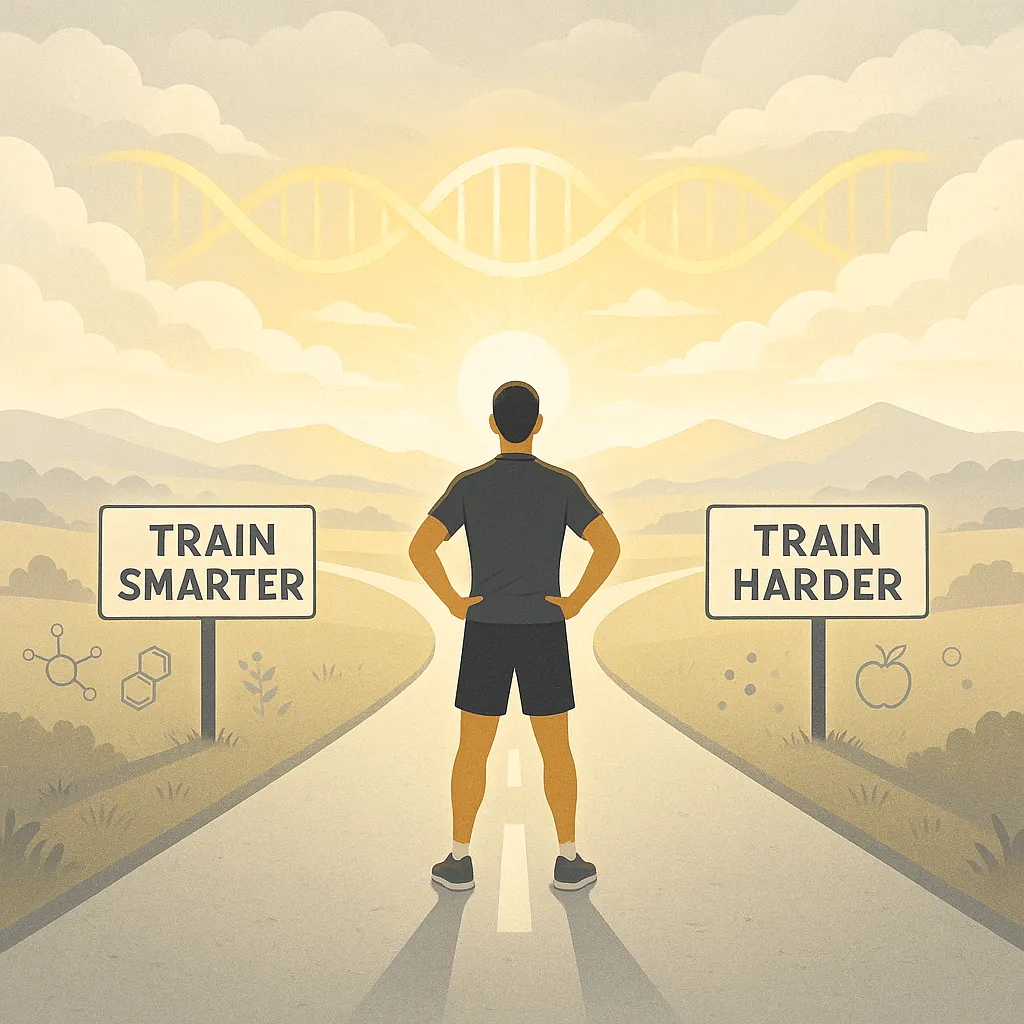
Genetic testing and nutrigenomics for athletes are reshaping the way we understand performance, nutrition, and recovery. No longer limited to elite professionals, these tools offer everyday athletes a personalized look into how their bodies are wired to respond to training and diet. By analyzing your DNA, you can uncover insights about everything from how efficiently you absorb nutrients to how your muscles recover after a workout. In this article, we’ll explore how athletes can use genetic insights to train smarter, eat better, and gain a competitive edge that starts from within.
Table of Contents
What’s the Deal with Genetic Testing?
Genetic testing isn’t just a buzzword — it’s a groundbreaking way to decode how your body is built to perform. By examining your DNA, scientists can identify genetic markers that influence everything from muscle composition and endurance potential to how your body processes nutrients or handles inflammation. Instead of relying on general fitness advice or one-size-fits-all training plans, you can gain insight into how your body is likely to respond to specific types of exercise, dietary choices, and recovery strategies.
Think of it as unlocking your body’s blueprint. Whether you’re trying to build strength, boost endurance, or avoid injury, this information offers a clearer, more personalized path forward — one that’s based on data, not guesswork.
How Can This Help Athletes?
For athletes, this kind of insight can be a game-changer. With the right testing and interpretation, you can discover:
The types of training (e.g., endurance vs. power) that match your genetic strengths
Which nutrients your body absorbs efficiently, and which ones it may need more of
How your genes influence inflammation, muscle recovery, and injury risk
Whether you’re genetically more sensitive to things like caffeine, stress, or sleep disruption — all of which affect performance and mental focus
When you understand how your body is programmed to respond, you’re not just training harder, you’re training smarter.
The Role of Nutrigenomics
Nutrigenomics is the science of how your genes interact with the nutrients you consume — and it’s becoming a powerful tool for athletes looking to gain an edge. By analyzing your genetic profile, nutrigenomics helps you create a diet tailored specifically to your body’s needs, instead of relying on generalized nutrition plans. Here’s how it can enhance athletic performance:
Optimized Nutrition: Genetic insights can reveal if your body struggles to absorb or utilize certain nutrients like vitamin D, B12, or iron. With this knowledge, you can adjust your diet or supplement intake to fill those gaps, improving energy, endurance, and immune function.
Improved Recovery: Nutrigenomics can help you choose the foods and supplements that best support your body’s ability to repair muscles, reduce inflammation, and bounce back after intense workouts, which lead to more consistent training with less downtime.
Enhanced Energy Levels: Some athletes metabolize carbohydrates or caffeine differently based on their genes. Understanding these differences can help you fuel more effectively, avoid energy crashes, and maintain peak output during both training and competition.
Reduced Risk of Injury: By identifying genetic factors related to bone density, joint health, or oxidative stress, nutrigenomics allows you to make dietary choices that strengthen resilience and reduce the likelihood of overuse injuries or inflammation-related issues.
Real-Life Success: Meet Alex
I recently chatted with Alex, a high school wrestler who used genetic testing and nutrigenomics to up his game. He told me, “It was a total game-changer. I made specific adjustments to my diet and training based on my genetic profile. It wasn’t instant but after a few weeks I started to notice differences such as more energy, the ability to focus better, better digestion, and building more muscle mass. The result? I made it to the state championships!”
Alex’s story isn’t unique. More and more athletes are turning to genetic insights and nutrigenomics to gain a competitive edge.

The Bottom Line
As athletes, we’re always looking for ways to improve. Genetic testing and nutrigenomics offer scientifically-backed, personalized approaches to enhancing our performance. It’s not about finding shortcuts – it’s about understanding your body’s unique needs and working smarter, not just harder.
Have you tried genetic testing and nutrigenomics for athletic performance? I’d love to hear about your experiences!
Remember, your DNA holds the key to unlocking your true potential. Are you ready to use it?
Is Genetic Testing and Nutrigenomics Right for You?
If you’re serious about taking your athletic performance to the next level, it’s definitely worth considering. Here’s why:
- Personalized Training: Focus on exercises that align with your genetic strengths.
- Optimized Nutrition: Fuel your body with the right nutrients in the right amounts.
- Enhanced Recovery: Reduce downtime and bounce back faster from intense workouts.
- Mental Edge: Understand how to maintain sharp focus and manage stress effectively.
Ready to Unlock Your Potential?
Getting started is easier than you might think. Elite Gene Labs offers a simple process:
- Take a quick DNA test (usually just a cheek swab)
- Wait for expert analysis of your genetic profile
- Receive personalized recommendations
- Enjoy ongoing support to help you achieve your goals
Conclusion
In the pursuit of better performance, faster recovery, and long-term health, understanding your body at the genetic level is no longer just an option for elite athletes — it’s becoming an essential part of modern training. Genetic testing and nutrigenomics for athletes offer a clearer, science-backed path to making smarter decisions about how you train, eat, and recover.
Every athlete is different, and your DNA can help explain why. With personalized insights, you can stop relying on trial and error and start making choices that truly fit your unique physiology. The future of athletic performance is personal — and it starts with understanding your genetics.
Frequently Asked Questions
What is nutrigenomics and how does it differ from genetic testing?
Nutrigenomics explores how the foods you eat influence gene expression—essentially how nutrients turn specific genes on or off. Genetic testing, in contrast, focuses on identifying variants in your DNA that affect how your body metabolizes nutrients or responds to exercise. Together, they provide insight into both your genetic predispositions and how your diet can interact with them.
What can genetic testing reveal about athletic performance?
Tests can uncover markers related to muscle fiber type (fast-twitch vs. slow-twitch), VO₂ max potential, inflammation response, and nutrient metabolism. These insights allow athletes to fine-tune training programs and diet to fit their unique biological strengths.
Are nutrigenomic recommendations personalized or just repackaged general advice?
Clinical-grade nutrigenomic tests examine dozens of genetic variants to generate customized dietary recommendations—such as optimizing vitamin D, iron, or caffeine intake—based on your specific genetic makeup, rather than one-size-fits-all guidelines.
Will following these insights make me perform like an elite athlete?
While genetic insights give you a significant edge, they don’t override hard work, consistent training, and lifestyle factors like sleep, stress, and overall diet quality. These tools enhance, but don’t replace, a solid foundation in athletic development .
Is genetic testing for nutrition and performance safe and reliable?
Genetic testing via cheek swabs or blood samples carries minimal physical risk. Main concerns involve data privacy, emotional impact, and possible misinterpretation without professional guidance. That’s why working with trained healthcare practitioners is recommended.
Do I need to work with a specialist to make sense of my results?
Yes. Most reputable nutrigenomic providers, like Nutrigenomix, require interpretation by certified health professionals—dietitians, clinicians, or performance coaches—to translate genetic data into practical plans.
Is this worth the cost if I already follow a healthy training and nutrition routine?
Genetic insights can help refine your existing regimen by identifying small but impactful adjustments—like pinpointing nutrient intolerances, optimal macronutrient ratios, and recovery strategies—that are tailored to your body.

